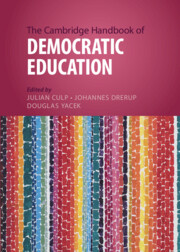Book contents
- The Cambridge Handbook of Democratic Education
- Cambridge Handbooks in Education
- The Cambridge Handbook of Democratic Education
- Copyright page
- Contents
- Contributors
- Acknowledgments
- Introduction
- Part One Historical Perspectives
- Part Two Philosophical and Normative Foundations
- Part Three Key Topics and Concepts
- 16 Educational Justice and Democratic Education
- 17 Global Justice and Democratic Education
- 18 Debate and Deliberation in Democratic Education
- 19 Agonistic Democracy and the Question of Education
- 20 Punishment and Democratic Education
- 21 Children’s Rights and Democratic Education
- 22 Education, Trust, and the Conversation of Democracy
- 23 Patriotism and Democratic Education
- 24 The Voice of Poetry in Cultivating Cosmopolitan and Democratic Imagination
- 25 Disability and Democratic Education
- Part Four Challenges
- Index
- References
25 - Disability and Democratic Education
from Part Three - Key Topics and Concepts
Published online by Cambridge University Press: 20 April 2023
- The Cambridge Handbook of Democratic Education
- Cambridge Handbooks in Education
- The Cambridge Handbook of Democratic Education
- Copyright page
- Contents
- Contributors
- Acknowledgments
- Introduction
- Part One Historical Perspectives
- Part Two Philosophical and Normative Foundations
- Part Three Key Topics and Concepts
- 16 Educational Justice and Democratic Education
- 17 Global Justice and Democratic Education
- 18 Debate and Deliberation in Democratic Education
- 19 Agonistic Democracy and the Question of Education
- 20 Punishment and Democratic Education
- 21 Children’s Rights and Democratic Education
- 22 Education, Trust, and the Conversation of Democracy
- 23 Patriotism and Democratic Education
- 24 The Voice of Poetry in Cultivating Cosmopolitan and Democratic Imagination
- 25 Disability and Democratic Education
- Part Four Challenges
- Index
- References
Summary
Publications on citizenship, democracy, and disability tend to focus almost exclusively on the labor market, the political system, as well as assistance and support, and not on education. The same holds true in reverse. Democracy in relation to education and schooling is often discussed in a restricted manner. Disability is not treated with specific interest in this context. This chapter addresses this gap with a specific focus on John Dewey’s theoretical considerations. It first outline key aspects of Dewey’s theoretical framework before turning to the issue of disability and the specific risks it entails for democratic life in general and democratic participation in particular. It then explores the question of whether Dewey’s pragmatist approach can be used to make progress for disabled people’s education. It particularly discusses tensions and dilemmas that disability poses for democratic and inclusive education.
Keywords
- Type
- Chapter
- Information
- The Cambridge Handbook of Democratic Education , pp. 416 - 432Publisher: Cambridge University PressPrint publication year: 2023

